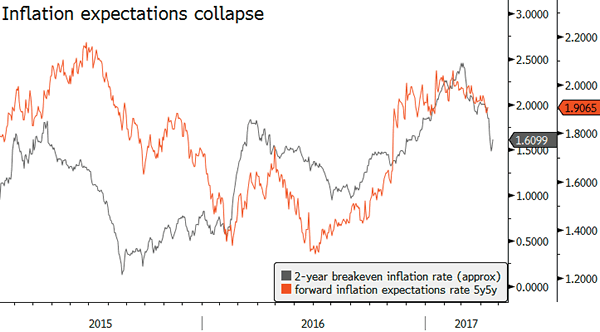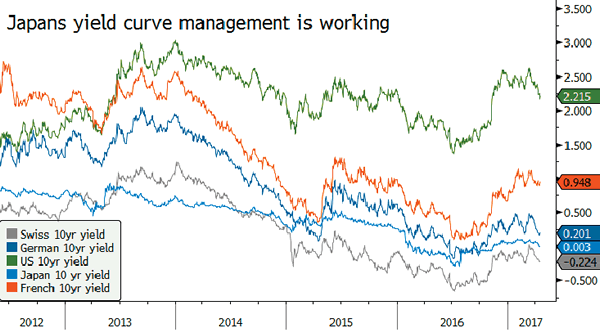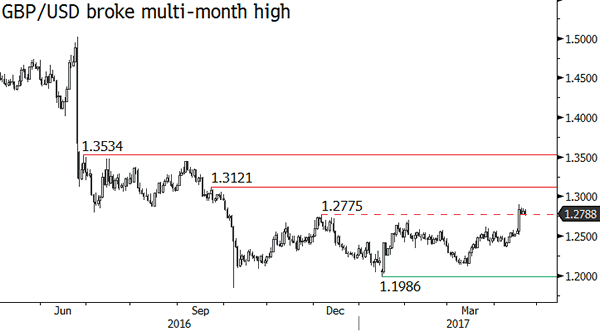- Falling US Rates Drive Down The Greenback – Arnaud Masset
- Rise In Geopolitical Risk – Peter Rosenstreich
- Sell JPY – Peter Rosenstreich
- Further GBP Gains Unlikely Before Snap Election – Arnaud Masset
Economics – Falling US Rates Drive Down The Greenback
In late March/early April, the US Dollar made a recovery attempt, with the Dollar index rising 2.50% from 98.86 to 101.34, against the backdrop of mounting nervousness about the upcoming French election and Brexit jitters. Those sharp gains were mostly due to a massive debasement of the Euro, which fell more than 3% to 1.0574, while the Japanese Yen was treading water between 110 and 112. Over that period, investors were less focused on developments in the US and particularly the failure of Donald Trump’s reform agenda. Investors took their time to send the Dollar back to where it came from as the Dollar capitalised on its status as a safe haven in a troubled environment.
Nevertheless, in the last week of March the wind began to rotate as investors started to call into question the viability of the Trump reflation trade. The equity rally paused as the S&P 500 eased slightly above 2,320 points – down from 2,400 in early March – as traders switched from equity to bonds, sending US 10-year Treasury yields back to 2.20%, compared to 2.62% a month earlier. On the short-end of the curve, the debasement was more acute, with two-year Treasury yields sliding 20bps to 1.17%, as the market slowly realised that the Fed won’t deliver three rate hikes this year.
More importantly, the Trump trade, which sent inflation expectations to the moon six months ago, has also started to unwind. Inflation expectations fell substantially since mid-March and dragged down US yields. The two-year breakeven inflation rate (approximation) slid at around 1.60% recently, while on the longer-term, inflation expectations remained stable, so far at least. We think it is just a matter of time before it starts to adjust to the downside as well. Inflation expectations 5y5y is still slightly above 1.90% compared to 1.50% in November last year.
All in all, we believe that is just the beginning and that this basic movement will continue, if not accelerate over the next few months. This re-pricing of inflation expectations will weigh substantially on the USD as treasury yields slid further. In the short-term, we would avoid playing this re-pricing against the Euro and the Pound as the political risk is still quite substantial. However, once the French elections are over, the Euro will be set free (should a pro-business candidate wins the French election). In the higher-yielding currency complex, we would favour long NZD position as speculators will continue to unwind their short positions.

Politics – Rise In Geopolitical Risk
After a long hiatus, geopolitical risk is back in investors’ calculations. Geopolitical tensions remained the market focus giving safe haven currencies JPY and CHF a boost. It’s likely after the French election results are in, geopolitical risk will continue to drive risk-taking. The US missile strike on Syria on 6th April and the largest non-nuclear bomb ever used in combat on 13th April in Afghanistan highlights President Trump’s willingness to use military forces.
While in Asia, China has increased the rhetoric around North Korea’s nuclear weapon development, which in turn is stressing warming China/ US relations. There is a current feeling that diplomatic responses may not be enough to lower the risk of further military actions. To emphases this, regarding dealing with North Korea, US Secretary of State Rex Tillerson stated: "Let me be very clear: the policy of strategic patience has ended." History indicates that unilateral missile strikes generally have an immediate negative effect on the markets but quickly recover nearly all loses within five days in most examples. Global stock market indices volatility generally remains elevated, while there is limited effect on gold, USD or bond yields.
In the case of a full blown regime change (executed by NATO in Iraq, Bosnia and Somalia), the stock markets response was mixed although on average there was a gain on the first day then further gains for the next week. Gold and oil prices generally fall after the first day. In Syria, we don’t see escalations above localized missile strikes. The decision to strike a single target (this case an airbase) or Syrian surface to air missile sites indicates that the move was not in preparation for a larger campaign. Syrian President Bashar al-Assad was not targeted suggesting that the US was not intending to change the regime or risk provoking the Russians.
A military escalation on the Korean peninsulas would have deeper downside risk. First, N. Korea is military prepared for defensive retaliation (or even first strike). Any action against N. Korea should be considered a total regime change operation. Any action aimed at N. Korea will have profound negative repercussions on financial markets. Japan and South Korea economics account for around 8% of the global GDP (stock markets of South Korea, Japan and China would see negative shocks). The spillover of disruption economic activity into world growth will be real.
The path of least resistance generally defines the path of geopolitics. And despite the erratic behaviour of many of the individuals involved (Trump, Putin, Assad, Kim Jong-un). it’s likely that a diplomatic strategy will continue. Already actions (offering for a better trade deal with the US or larger US military presence in the region) by the US have forced China to take a strong stance on N. Korea including new sanctions. While regional military conflict generally has a negative market impact, the mid-term view is that the impact is negligible.
We understand the headlines are scary and force investors to contemplate the unimaginable. However, investors are better served to follow the historical market impact norms and not overreact to geopolitical developments. As we have sated at the start of 2017, fundamentals remain the core driver of asset prices and this will continue barring an extreme event.
FX Market – Sell JPY
Developments in Europe support our short JPY call. We had anticipated a pullback in USD demand but that downwards correction in USDJPY has outpaced our expectations. We anticipate a recovery to resistance at 112.15. The JPY has been supported less by growing inflation expectations but rather weakening in global risk environment. JPY remains the dominant risk aversion trade above gold, USD and CHF (however, we are not seeing significant JPY buying on fluctuations in French polls).
Clearly, rising geopolitical worries have caused investors to rotate out of risky assets and into JPY. We suspect tensions have reached a peak and suspect that the historically customary path of diplomacy will takeover. IMM positioning indicates that the JPY is well overbought suggesting room for readjustments. This week’s BoJ meeting will bring no meaningful adjustment to the current strategy as policy board members are likely to shift focus on personal changes rather than monetary policy. Last week the BoJ nominated two very dovish members showing support for aggressive balance sheet expansion to its committee.
For now, the realization is that the BoJ ¥80trn annual balance sheet expansion is unstable, leading to a switch to yields curve control that will dictate strategy. While the ECB inches towards tapering and the Fed contemplates the next 25 bp hike, the BoJ policy continues to be the loosest. This strategy should remain supportive of USDJPY. Yet, it is not the BoJ that will drive USDJPY higher but the reactions of the US economy and interest rate. The US economy seems to have slipped into a period of cyclical softness which should organically pick up in early summer. However, while investors have all but thrown the Trump-reflation trade away, there is still the probability that that the Trump administration gets a pro-growth win (tax reform remains the clearest).
Developments in Europe support our short JPY call. We had anticipated a pullback in USD demand but that downwards correction in USDJPY has outpaced our expectations. We anticipate a recovery to resistance at 112.15. The JPY has been supported less by growing inflation expectations but rather weakening in global risk environment. JPY remains the dominant risk aversion trade above gold, USD and CHF (however, we are not seeing significant JPY buying on fluctuations in French polls).

Economics – Further GBP Gains Unlikely Before Snap Election
Theresa May surprised markets last week as she seeks an early general election on June 8. Looking at GBP’s price action, it seems that market participants were quite happy with this decision as the Pound rose more than 2% against the greenback, with GBP/USD hitting 1.2905 on Tuesday afternoon.
This sharp GBP appreciation amid the announcement suggests that PM May’s decision is a good thing for the UK economy. We do not share this optimism as we believe it just increases the uncertainty, particularly in relation to the Brexit negotiations and the UK political landscape. Indeed, Theresa May has made a risky but necessary gamble by seeking a direct mandate. On the one hand, it gives her the opportunity to strengthen the Tory majority in the House of Commons, which would heighten her negotiation power in the upcoming Brexit negotiations. In addition, it gives her the opportunity to get rid of the 2015 Tory programme. But on the other hand, it gives a second chance to the British people to speak out about the Brexit referendum and also gives an opportunity to other parties to make a comeback. Therefore, we think that the market overly reacted to the announcement, as the only thing that has increased is the level uncertainty.
In the short-term though, we remain cautious on further Pound gains as investors will act carefully ahead of the election (if it actually takes place). In the longer-term, a strengthening of Conservatives’ position would definitely bolster the Pound as it will put the country in a better position to negotiate the terms of its divorce with the EU.

